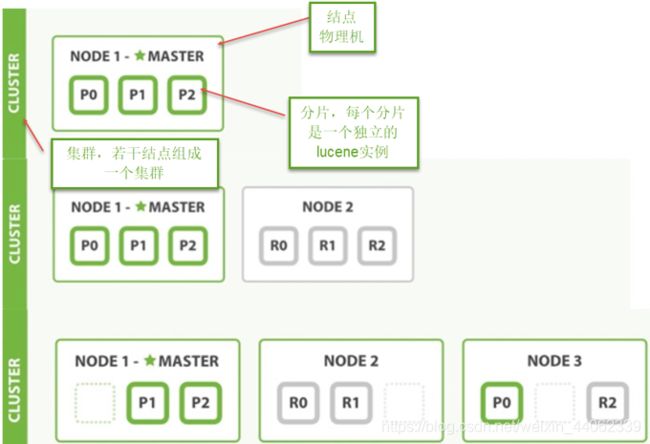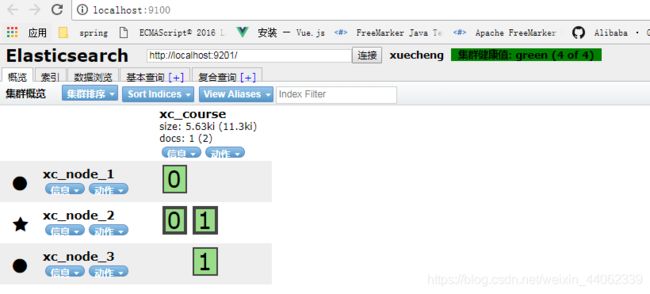Elasticsearch6.2 研究--集群管理
目录
- 8 Elasticsearch6.2集群管理
- 8.1 集群结构
- 8.2 搭建集群
- 8.2.1 结点的三个角色
- 8.2.2创建结点 1
- 8.2.3创建结点 2
- 8.2.4 创建索引库
- 8.2.5 集群的健康
- 8.3 测试
8 Elasticsearch6.2集群管理
8.1 集群结构
Elasticsearch通常以集群方式工作,这样做不仅能够提高 ES的搜索能力还可以处理大数据搜索的能力,同时也增加了系统的容错能力及高可用,Elasticsearch可以实现PB级数据的搜索。
从上图总结以下概念:
1、结点
ES集群由多个服务器组成,每个服务器即为一个Node结点(该服务只部署了一个ES进程)。
2、分片
当我们的文档量很大时,由于内存和硬盘的限制,同时也为了提高ES的处理能力、容错能力及高可用能力,我们将索引分成若干分片,每个分片可以放在不同的服务器,这样就实现了多个服务器共同对外提供索引及搜索服务。
一个搜索请求过来,会分别从各各分片去查询,最后将查询到的数据合并返回给用户。
3、副本
为了提高ES的高可用同时也为了提高搜索的吞吐量,我们将分片复制一份或多份存储在其它的服务器,这样即使当前的服务器挂掉了,拥有副本的服务器照常可以提供服务。
4、主结点
一个集群中会有一个或多个主结点,主结点的作用是集群管理,比如增加节点,移除节点等,主结点挂掉后ES会重新选一个主结点。
5、结点转发
每个结点都知道其它结点的信息,我们可以对任意一个结点发起请求,接收请求的结点会转发给其它结点查询数据。
8.2 搭建集群
下边的例子实现创建一个2结点的集群,并且索引的分片我们设置2片,每片一个副本。
8.2.1 结点的三个角色
主结点:master节点主要用于集群的管理及索引 比如新增结点、分片分配、索引的新增和删除等。
数据结点:data 节点上保存了数据分片,它负责索引和搜索操作。
客户端结点:client 节点仅作为请求客户端存在,client的作用也作为负载均衡器,client 节点不存数据,只是将请求均衡转发到其它结点。
通过下边两项参数来配置结点的功能:
node.master: #是否允许为主结点
node.data: #允许存储数据作为数据结点
node.ingest: #是否允许成为协调节点,
四种组合方式:
master=true,data=true:即是主结点又是数据结点
master=false,data=true:仅是数据结点
master=true,data=false:仅是主结点,不存储数据
master=false,data=false:即不是主结点也不是数据结点,此时可设置ingest为true表示它是一个客户端。
8.2.2创建结点 1
解压Elasticsearch-6.2.1.zip 到 F:\devenv\Elasticsearch\es-cloud-1\Elasticsearch-6.2.1
结点1对外服务的http端口是:9200
集群管理端口是9300
配置Elasticsearch.yml
结点名:xc_node_1
Elasticsearch.yml内容如下
cluster.name: xuecheng
node.name: xc_node_1
network.host: 0.0.0.0
http.port: 9200
transport.tcp.port: 9300
node.master: true
node.data: true
discovery.zen.ping.unicast.hosts: ["0.0.0.0:9300", "0.0.0.0:9301"]
discovery.zen.minimum_master_nodes: 1
node.ingest: true
node.max_local_storage_nodes: 2
path.data: D:\Elasticsearch\Elasticsearch-6.2.1-1\data
path.logs: D:\Elasticsearch\Elasticsearch-6.2.1-1\logs
http.cors.enabled: true
http.cors.allow-origin: /.*/
启动结点1
8.2.3创建结点 2
解压Elasticsearch-6.2.1.zip 到 F:\devenv\Elasticsearch\es-cloud-2\Elasticsearch-6.2.1
结点1对外服务的http端口是:9201
集群管理端口是9301
结点名:xc_node_2
Elasticsearch.yml内容如下
cluster.name: xuecheng
node.name: xc_node_2
network.host: 0.0.0.0
http.port: 9201
transport.tcp.port: 9301
node.master: true
node.data: true
discovery.zen.ping.unicast.hosts: ["0.0.0.0:9300", "0.0.0.0:9301"]
discovery.zen.minimum_master_nodes: 1
node.ingest: true
node.max_local_storage_nodes: 2
path.data: D:\Elasticsearch\Elasticsearch-6.2.1-2\data
path.logs: D:\Elasticsearch\Elasticsearch-6.2.1-2\logs
http.cors.enabled: true
http.cors.allow-origin: /.*/
启动结点2
8.2.4 创建索引库
1)使用head连上其中一个结点
上图表示两个结点已经创建成功。
2)下边创建索引库,共2个分片,每个分片一个副本。
创建成功,刷新head:
上图可以看到共有4个分片,其中两个分片是副本。
3)每个结点安装IK分词器
略
8.2.5 集群的健康
通过访问 GET /_cluster/health 来查看Elasticsearch 的集群健康情况。
用三种颜色来展示健康状态: green 、 yellow 或者 red 。
green:所有的主分片和副本分片都正常运行。
yellow:所有的主分片都正常运行,但有些副本分片运行不正常。
red:存在主分片运行不正常。
Get请求:http://localhost:9200/_cluster/health
响应结果:
{
"cluster_name": "xuecheng",
"status": "green",
"timed_out": false,
"number_of_nodes": 2,
"number_of_data_nodes": 2,
"active_primary_shards": 2,
"active_shards": 4,
"relocating_shards": 0,
"initializing_shards": 0,
"unassigned_shards": 0,
"delayed_unassigned_shards": 0,
"number_of_pending_tasks": 0,
"number_of_in_flight_fetch": 0,
"task_max_waiting_in_queue_millis": 0,
"active_shards_percent_as_number": 100
}
8.3 测试
1)创建映射并写入文档
连接 其中任意一台结点,创建映射写入文档。
Post http://localhost:9200/xc_course/doc/3
{
"name": "spring开发基础",
"description": "spring 在java领域非常流行,java软件开发人员都在用。",
"studymodel": "201001",
"price":66.6
}
响应结果:
{
"_index": "xc_course",
"_type": "doc",
"_id": "3",
"_version": 1,
"result": "created",
"_shards": {
"total": 2,
"successful": 2,
"failed": 0
},
"_seq_no": 0,
"_primary_term": 1
}
从上边的提示可看出,两个分片都保存成功。
2)搜索
向其它一个结点发起搜索请求,查询全部数据。
3)关闭一个结点
ES会重新选中一个主结点(前提在配置结点时允许它可以为主结点)
4)添加一个结点
添加结点3,端口设置为:
http端口是:9202
集群管理端口是9302
结点名:xc_node_3
此结点的配置:
node.master: false
node.data: true
启动结点3,刷新head,下图显示ES将分片及副本均匀分在了3个结点(注意环境不同分布的结果可能不同)
Get: http://127.0.0.1:9202/xc_course/doc/_search
全部数据可被正常搜索到。





